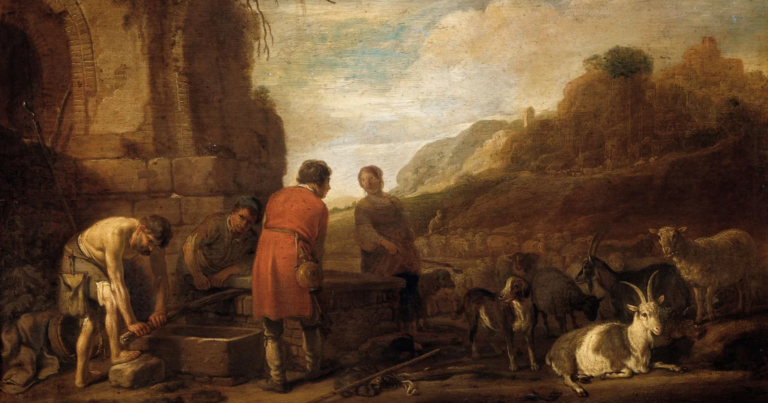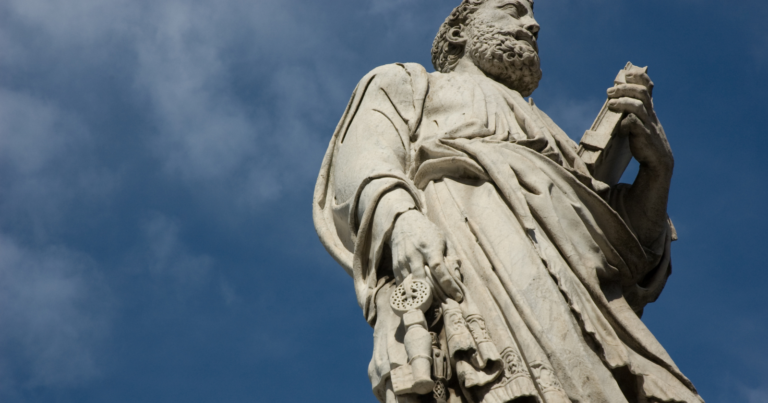“But you, dear friends, by building yourselves up in your most holy faith and praying in the Holy Spirit, keep yourselves in God’s love as you wait for the mercy of our Lord Jesus Christ to bring you to eternal life.”
Jude 1:20-21
Have you ever felt lost in the whirlwind of modern philosophies, questioning what truth and morality really mean today?
The Letter of St. Jude, nestled quietly at the end of the New Testament, speaks directly to this confusion.
Written as a passionate plea for faithfulness amidst a sea of false teachings, its message is strikingly relevant for our times.
St. Jude, with the urgency of one who has seen the light amidst the darkness, calls us to anchor our lives in the unchanging truth of the Gospel.
Let’s explore the key messages in St. Jude’s letter, reflect on their relevance today, and provide guidance on how they can inspire personal growth in our everyday lives.
Who is St. Jude in the Bible?
St. Jude, known as Jude Thaddeus, holds a distinctive place in the Bible as one of the twelve Apostles.
His significance is further highlighted by his familial connection as the brother of James the Less and a relative of Jesus, lending his words a special weight and authority within the Christian tradition.
This apostle’s unique contribution to the New Testament is encapsulated in his own epistle. Despite its brevity, the letter has left a lasting impact on Christian doctrine and practice.
St. Jude’s role as a “servant of Jesus Christ” and “brother of James” positions him as a key figure in the early Christian community.
Among Christians, he was known for his deep commitment to the teachings of Christ and for addressing the challenges faced by believers.
His voice, though from centuries past, continues to inspire and guide believers today.
Understanding St. Jude’s letter
St. Jude’s Letter, also known as the Epistle of Jude, is a brief yet powerful part of the New Testament.
It’s a pastoral letter in nature and aims to address false teachings and apostasy, urging believers to stand firm in their faith.
St. Jude calls for spiritual vigilance, emphasizing the need for believers to build themselves up in faith (Jude 1:20).
The structure of the letter is simple, yet profound.
It commences with a greeting, then swiftly moves into its main theme – combating apostasy.
What’s more, it provides historical examples of divine judgment on unbelief and immorality, serving as a stark warning to believers.
Interestingly, St. Jude’s letter is the sole scripture that names Michael as an Archangel. That’s how it connects with the Second Letter of Peter over the issue of false teachings.
Moreover, it references works not found in the traditional biblical canon—the Assumption of Moses and the Book of Enoch, adding layers of mystery and depth.
Towards the end, St. Jude offers practical advice on how to remain steadfast in faith amidst challenging times, ultimately inspiring hope and perseverance.
Key themes in St. Jude’s letter
1) Fighting apostasy
A significant theme in St. Jude’s Letter is the battle against apostasy.
St. Jude warns believers about individuals who have infiltrated the community. For this, he spreads false teachings and leads others away from the faith.
Simply put, he calls for vigilance and discernment to identify and combat these divisive elements.
Here’s the thing:
Jude doesn’t mince words — he labels the apostates as “godless men” who pervert grace into a license for immorality.
It’s a raw look at the challenges the early Christian community faced, mirroring struggles that resonate today.
Jude uses vivid imagery to describe these false teachers as “clouds without rain,” promising much but delivering nothing.
He warns of their ultimate fate, reminding the faithful of the importance of discernment and steadfastness.
2) Building faith
“Build yourselves up on your most holy faith”
Jude 1:20
Contrasting the stark warnings against apostasy, St. Jude offers a blueprint for building a resilient faith. This quote above underscores the theme of spiritual growth in St. Jude’s Letter.
It implies that faith is not static, but rather, it should be nurtured and grown.
In simple terms, believers are encouraged to actively engage with their faith, continuously seeking to understand and apply its teachings.
And let’s face it:
It’s somewhat counterintuitive — amid dire warnings, he provides a recipe for hope and spiritual growth.
“But you, dear friends, build yourselves up in your most holy faith,” he advises, encouraging believers to pray in the Holy Spirit, keep themselves in God’s love, and wait for Jesus Christ’s mercy.
Here, Jude shifts the focus from the external threats posed by false teachers to the internal strength found in personal devotion and communal support.
3) False teachers and their influence
St. Jude’s letter exposes the perilous influence of false teachers with an incisive clarity that still speaks volumes today.
He compares these deceivers to “hidden reefs at your love feasts”.
That’s how he illustrates how they operate under the radar, causing harm within the community.
Now, let’s consider an example that brings this to life involves a leader who, while charismatic, subtly twists scripture to justify unethical behaviors, leading unsuspecting followers astray.
Jude’s message is a practical call to vigilance, urging believers to be discerning and to uphold the truth.
And it’s not it just a warning — it’s an empowering reminder that knowledge and wisdom are key defenses against deception.
By staying grounded in the teachings of the gospel, believers can protect their community from the corrosive effects of false teachings.
4) Divine judgment and mercy
“Keep yourselves in God’s love as you wait for the mercy of our Lord Jesus Christ to bring you to eternal life.”
Jude 1:21
One of the standout ideas from St. Jude’s Letter is the concept of divine grace.
St. Jude emphasizes that believers should keep themselves in God’s love and await His mercy.
This calls for a proactive relationship with God, one where we consciously choose to remain within His love.
Experiencing divine grace involves:
- Maintaining faith even in challenging times
- Engaging in prayer and other spiritual practices
- Exhibiting love and mercy towards others
Staying in God’s love is not a passive act but requires intentional effort. In doing so, we position ourselves to receive His mercy, leading us towards eternal life.
Interestingly, sometimes believers think that divine judgment is a theme of the Old Testament only. However, Jude’s Letter emphasizes that it holds true in the New Testament as well.
5) The Doxology
St. Jude’s Letter concludes with a powerful doxology (Jude 1:24-25) — a hymn of praise to God who is able to keep us from falling and present us blameless before His glory.
The doxology closes the letter and lifts the reader’s gaze from the earthly struggles against falsehood and sin to the heavenly realms of glory and grace.
It reads:
“To him who is able to keep you from stumbling and to present you before his glorious presence without fault and with great joy — to the only God our Savior be glory, majesty, power, and authority, through Jesus Christ our Lord, before all ages, now and forevermore! Amen.”
This passage is not merely a conclusion. It’s a powerful affirmation of God’s unwavering support for believers.
Most importantly, it reminds us of God’s greatness, power, and eternal dominion, reinforcing the central theme of unwavering faith.
What can we learn from the Book of Jude?
The Book of Jude, though brief, is a powerful component of the New Testament that offers timeless lessons for believers.
Here’s what we can learn from it:
Vigilance against false teachings
Jude’s letter is a stark reminder of the ever-present danger of false teachings infiltrating the faith community.
It urges believers to be discerning, to question, and to test the teachings they encounter against the truth of the Gospel.
- Be aware of the teachings you embrace; compare them with the core tenets of your faith.
- Encourage open discussions within your community to foster a culture of learning and vigilance.
The importance of faith and moral integrity
Jude emphasizes the necessity of maintaining one’s faith and moral integrity amidst a world filled with moral relativism and the allure of sin.
Based on his teachings, you should
- Cultivate a personal relationship with your faith through prayer, meditation, and study.
- Lead by example, showing others the strength and peace that come from a life lived by one’s beliefs.
The power of community in sustaining faith
Jude’s call to build each other up in faith highlights the communal aspect of belief.
Faith is not a solitary journey — it’s a shared expedition where believers support each other.
So, what’s your takeaway?
- Engage in community service and group worship to strengthen the bonds within your faith community.
- Offer support to those who struggle, remembering that encouragement can be a powerful tool in maintaining faith.
Hope in divine mercy
Despite the letter’s warnings about judgment, it also reassures us of God’s mercy and the promise of salvation for those who remain steadfast in their faith.
That’s why you should remember that everyone is on their own spiritual journey. So:
- Extend grace and forgiveness as freely as you hope to receive it.
- Keep hope alive in your heart, especially during times of personal or collective trials.
Final thoughts: Applying St. Jude’s wisdom
To sum up, the Letter of St. Jude, despite its brevity, is a rich source of wisdom and guidance.
It offers practical advice for spiritual self-care, combating apostasy, showing mercy, and experiencing divine grace.
These timeless teachings hold immense relevance in today’s world, calling us to lead lives rooted in faith and love.
Applying St. Jude’s wisdom involves conscious effort and intentional living. It is about nurturing our faith, exercising discernment, practicing compassion, and remaining in God’s love.
Let the wisdom of St. Jude guide your actions and decisions, helping you live out your faith in a meaningful way.












